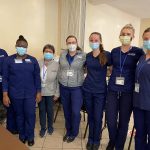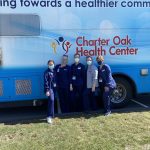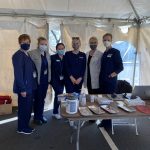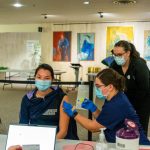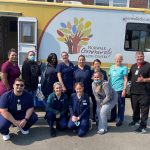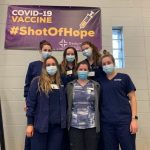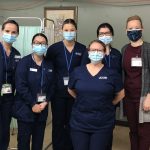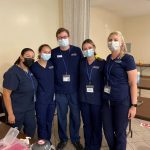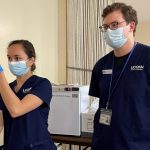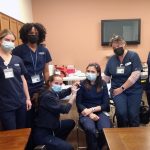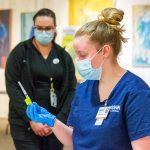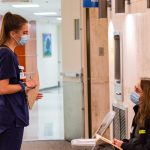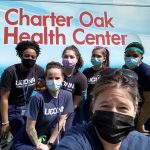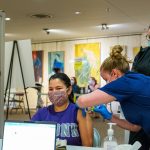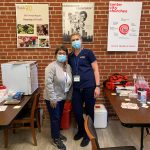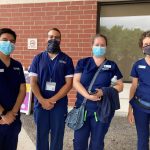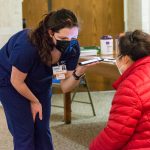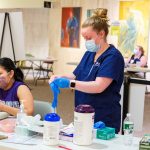You need two things in order to vaccinate an entire population: enough vaccines and enough health care workers to administer them.
In early 2021, as COVID-19 vaccine production ramped up, hospitals, community health centers, and other health care facilities in Connecticut desperately needed more hands to staff their vaccination clinics. Luckily, UConn School of Nursing was ready and eager to step in.
Throughout the spring and summer of this year, School of Nursing students and faculty participated in over 90 vaccination-related initiatives. The School partnered with community health centers, such as Charter Oak Health Center in Hartford and Norwalk Community Health Center, and assisted in administering nearly 1,600 vaccines.

“I am incredibly proud of our students and faculty,” Dean Deborah Chyun says. “This is a historic time and they did not shy away from volunteering to help others become protected from the virus. Communities are safer and healthier now, and I am honored that the School had even a small role in making that happen.”
Over 70 School of Nursing students participated in the vaccine clinics, along with 15 faculty members. Many said it was a life-changing experience.
“This experience gave me new perspectives about my role as a future nurse,” Neyssa Jean Michel ’22 (NUR) says. “Listening to the patients’ opinions about what we help accomplish made me realize that I am making an impact on each of them and on the community. My role as a future nurse will not only be to care for them and be an advocate, but I’m also responsible to make the patients’ experience, stay, or visit as positive and as smooth as possible.”
Thanks to the leadership of Associate Dean Angela Starkweather, students first became involved in vaccination outreach in January, when UConn Health began vaccinating their front-line workers. Around 20 students administered vaccines in the hospital’s Keller lobby and observed patients for any adverse reactions.
“It felt good to be doing something to help after a year of feeling helpless against the virus. I felt like I was a part of something bigger that was making a difference.” — Kimberly Diaz ’21 (NUR)
That clinic was just the beginning. By early spring, as vaccination appointments became available to more and more people in Connecticut, the School hired Michelle Cole as community outreach liaison to work with Starkweather and help coordinate with area health care providers.
“Angela and Michelle have been vital to our outreach efforts,” Chyun says. “They have done a phenomenal job finding out which facilities need more hands to administer vaccines and rallying our students accordingly.”
One of the important partnerships that developed between the School of Nursing and Hartford’s Charter Oak Health Center was spearheaded by Neuro-immunology Nurse Practitioner Marina A. Creed ’17 MS, from the UConn Health Multiple Sclerosis Center in the Department of Neurology. Creed brought together the School of Nursing’s and the School of Medicine’s Urban Service Track/AHEC Scholars Program students, along with staff from Charter Oak Health Center, to help protect disenfranchised, vulnerable patients from the virus through expanded access to vaccines. School of Nursing faculty and students volunteered at many of Charter Oak’s clinics throughout the spring and summer. Some locations included Christ Church of Deliverance, Dunkin’ Donuts Park, and others.
Connecticut opened the nation’s first FEMA Mobile Vaccination Unit at the end of March, and UConn Health was one of the four health systems in the state selected to provide clinical oversight and staffing. UConn Health, in turn, asked the School of Nursing to lead two specific days: April 30 in Dayville and May 4 in Willimantic.
“The opportunity to collaborate with UConn Health as part of a statewide initiative was rewarding,” Cole says. “Students and faculty engaged with local communities to accelerate vaccination efforts in identified areas, and students were able to appreciate the impact nursing has on the health of a community from a national, state, and local perspective.”
While demand for vaccines dropped as the calendar turned to summer, the School continued its work with Charter Oak Health Center and joined forces with Norwalk Community Health Center. These partnerships were especially beneficial to Certificate Entry Into Nursing (CEIN/BS) Program students, whose studies run from January to December and who need to complete clinical hours during the summer semester.
“All of our students and faculty have faced their own challenges throughout the pandemic, so being able to join forces with our community, listen to concerns, build trust, and work together to get everyone vaccinated has given us all a glimmer of hope,” Starkweather says. “Our students were eager to take part in the vaccination outreach efforts across Connecticut and it has been an inspiration to see them using their knowledge and skills in our communities and as a vital part of our public health response.”

Amanda Moreau supervises Alyssa Michaud ’22
(NUR), left, and Michelle Franklin ’21 (NUR), right,
as they practice injections in an orange during a
Covid-19 vaccination clinic at UConn Health in January. (Tina Encarnacion/UConn Health photo)
No matter the location, faculty supervised students every step of the way and were impressed with their skills and attentiveness to patients.
“Students provided significant support when individuals at the clinics were hesitant to receive the vaccine,” Cole says. “Students generally were able to successfully engage with the patients, with guidance from the rest of the School of Nursing team, and elicit positive responses.”
Normally, nursing students do not administer this many injections in their clinical training, but now they are pros. And their skills may come in handy again soon, as members of the community look to receive their booster doses or have their children vaccinated.
“It felt good to be doing something to help after a year of feeling helpless against the virus,” says Kimberly Diaz ’21 (NUR), a student in the CEIN Program. “I felt like I was a part of something bigger that was making a difference.”
Follow the UConn School of Nursing on Facebook, Instagram, Twitter, or LinkedIn.

